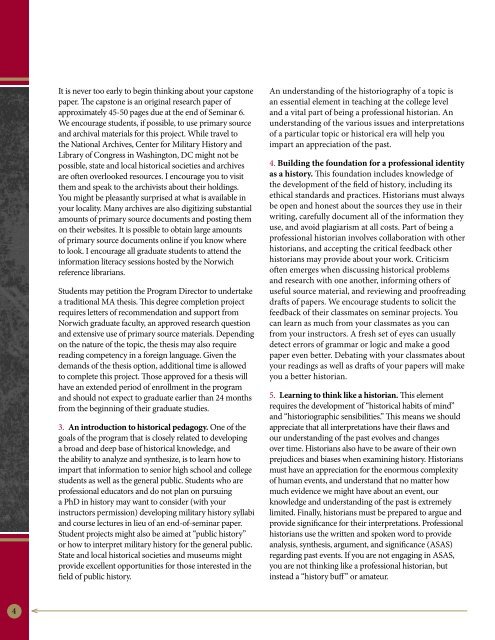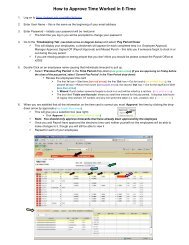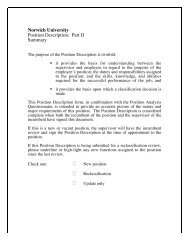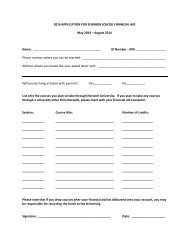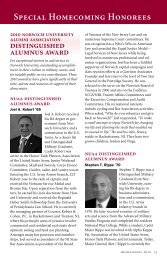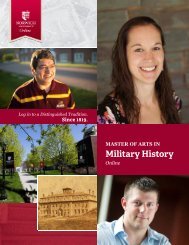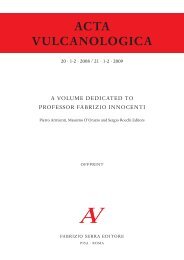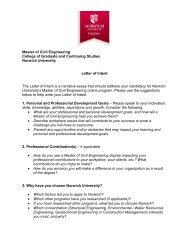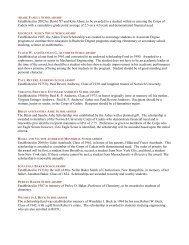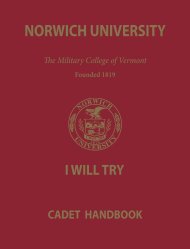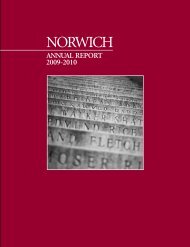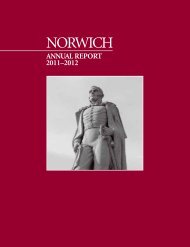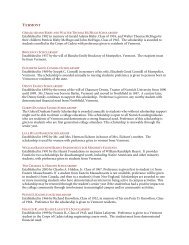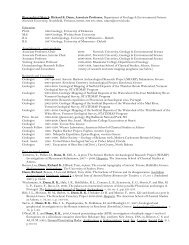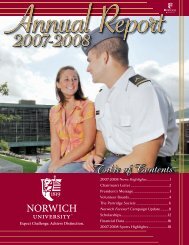Surviving Master's-Level History Programs at Norwich University: A ...
Surviving Master's-Level History Programs at Norwich University: A ...
Surviving Master's-Level History Programs at Norwich University: A ...
- No tags were found...
Create successful ePaper yourself
Turn your PDF publications into a flip-book with our unique Google optimized e-Paper software.
It is never too early to begin thinking about your capstonepaper. The capstone is an original research paper ofapproxim<strong>at</strong>ely 45-50 pages due <strong>at</strong> the end of Seminar 6.We encourage students, if possible, to use primary sourceand archival m<strong>at</strong>erials for this project. While travel tothe N<strong>at</strong>ional Archives, Center for Military <strong>History</strong> andLibrary of Congress in Washington, DC might not bepossible, st<strong>at</strong>e and local historical societies and archivesare often overlooked resources. I encourage you to visitthem and speak to the archivists about their holdings.You might be pleasantly surprised <strong>at</strong> wh<strong>at</strong> is available inyour locality. Many archives are also digitizing substantialamounts of primary source documents and posting themon their websites. It is possible to obtain large amountsof primary source documents online if you know whereto look. I encourage all gradu<strong>at</strong>e students to <strong>at</strong>tend theinform<strong>at</strong>ion literacy sessions hosted by the <strong>Norwich</strong>reference librarians.Students may petition the Program Director to undertakea traditional MA thesis. This degree completion projectrequires letters of recommend<strong>at</strong>ion and support from<strong>Norwich</strong> gradu<strong>at</strong>e faculty, an approved research questionand extensive use of primary source m<strong>at</strong>erials. Dependingon the n<strong>at</strong>ure of the topic, the thesis may also requirereading competency in a foreign language. Given thedemands of the thesis option, additional time is allowedto complete this project. Those approved for a thesis willhave an extended period of enrollment in the programand should not expect to gradu<strong>at</strong>e earlier than 24 monthsfrom the beginning of their gradu<strong>at</strong>e studies.3. An introduction to historical pedagogy. One of thegoals of the program th<strong>at</strong> is closely rel<strong>at</strong>ed to developinga broad and deep base of historical knowledge, andthe ability to analyze and synthesize, is to learn how toimpart th<strong>at</strong> inform<strong>at</strong>ion to senior high school and collegestudents as well as the general public. Students who areprofessional educ<strong>at</strong>ors and do not plan on pursuinga PhD in history may want to consider (with yourinstructors permission) developing military history syllabiand course lectures in lieu of an end-of-seminar paper.Student projects might also be aimed <strong>at</strong> “public history”or how to interpret military history for the general public.St<strong>at</strong>e and local historical societies and museums mightprovide excellent opportunities for those interested in thefield of public history.An understanding of the historiography of a topic isan essential element in teaching <strong>at</strong> the college leveland a vital part of being a professional historian. Anunderstanding of the various issues and interpret<strong>at</strong>ionsof a particular topic or historical era will help youimpart an appreci<strong>at</strong>ion of the past.4. Building the found<strong>at</strong>ion for a professional identityas a history. This found<strong>at</strong>ion includes knowledge ofthe development of the field of history, including itsethical standards and practices. Historians must alwaysbe open and honest about the sources they use in theirwriting, carefully document all of the inform<strong>at</strong>ion theyuse, and avoid plagiarism <strong>at</strong> all costs. Part of being aprofessional historian involves collabor<strong>at</strong>ion with otherhistorians, and accepting the critical feedback otherhistorians may provide about your work. Criticismoften emerges when discussing historical problemsand research with one another, informing others ofuseful source m<strong>at</strong>erial, and reviewing and proofreadingdrafts of papers. We encourage students to solicit thefeedback of their classm<strong>at</strong>es on seminar projects. Youcan learn as much from your classm<strong>at</strong>es as you canfrom your instructors. A fresh set of eyes can usuallydetect errors of grammar or logic and make a goodpaper even better. Deb<strong>at</strong>ing with your classm<strong>at</strong>es aboutyour readings as well as drafts of your papers will makeyou a better historian.5. Learning to think like a historian. This elementrequires the development of “historical habits of mind”and “historiographic sensibilities.” This means we shouldappreci<strong>at</strong>e th<strong>at</strong> all interpret<strong>at</strong>ions have their flaws andour understanding of the past evolves and changesover time. Historians also have to be aware of their ownprejudices and biases when examining history. Historiansmust have an appreci<strong>at</strong>ion for the enormous complexityof human events, and understand th<strong>at</strong> no m<strong>at</strong>ter howmuch evidence we might have about an event, ourknowledge and understanding of the past is extremelylimited. Finally, historians must be prepared to argue andprovide significance for their interpret<strong>at</strong>ions. Professionalhistorians use the written and spoken word to provideanalysis, synthesis, argument, and significance (ASAS)regarding past events. If you are not engaging in ASAS,you are not thinking like a professional historian, butinstead a “history buff” or am<strong>at</strong>eur.4


